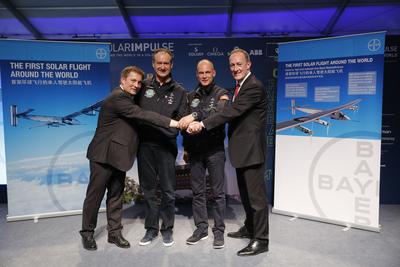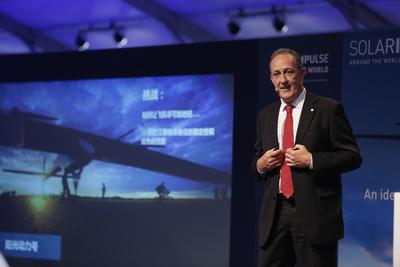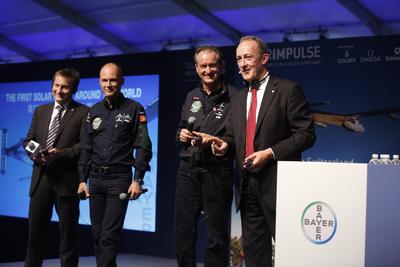NANJING, China, April 25, 2015 /PRNewswire/ -- To celebrate the successful touchdown of the first manned solar-powered aircraft Solar Impulse 2 at Nanjing, China, Bayer MaterialScience, one of the official project partners, holds a hospitality day at Nanjing Lukou International Airport to share the company's innovative solutions that enabled the Solar Impulse 2 aircraft and stories behind the project with customers, media and employees.

Hi-tech materials address the challenges faced by the visionaries
The plane was built to navigate around the world solely powered by the sun, without a drop of fossil fuel. Therefore, it had to be ultra-light weight to optimize the use of solar energy and provide superior insulation to cope with the extreme temperature differences on the ground and in the air, while ensuring utmost stability and excellent aerodynamics.
"Our aim is to provide sustainable materials and solutions that benefit the people, the planet and company profit. Therefore, we are engaging in applying our competence and developing solutions to innovative projects that aim at fostering clean technologies in order to help shape a more sustainable future. That's why we engaged with Solar Impulse to turn a vision in into reality," explained Richard Northcote, Member of the Executive Committee and Global Head of Sustainability at Bayer MaterialScience. The solar powered machine is equipped with hi-tech materials from Bayer MaterialScience.

Multiple high-tech materials from Bayer MaterialScience well address the challenges faced by the unprecedented project. Baytherm ® Microcell for the aircraft door improves the insulating performance by as much as 10 percent compared to current standard. Outside the cockpit, the material is also used to insulate the batteries. The rest of the cockpit shell is made of a different type of rigid polyurethane foam from Bayer MaterialScience. A polyurethane/carbon fiber composite material was used for the door locks, transparent polycarbonate thin sheets for the window as well as raw materials for the silvery coating covering large portions of the aircraft.
Ultimately, the aircraft weighs only 2.3 tones and can endure the temperature fluctuations between minus 40 degrees Celsius at night and plus 40 degrees at daytime. With a wingspan of 72 meter (larger than that of Boeing 747) covered by more than 17,200 solar cells, Solar Impulse 2 is the largest aircraft ever built with such a low weight, equivalent to that of a small car.

More areas to benefit from innovative materials
"Solar Impulse is not the only innovative project that has benefited from our hi-tech materials and solutions. The solar plane is a platform and showcase for Bayer MaterialScience to test high-performance materials and develop more potential applications for other industries, such as lightweight parts in cars to reduce fuel consumption" said Dr. Christian Haessler, Head of Polymer Research and Development Center, Bayer MaterialScience Innovation APAC.
Not long ago, the China South Railway Group chose Bayblend® and Makrolon® polycarbonate sheets from Bayer MaterialScience to manufacture the interiors of its tramcars. These materials not only provided lighter weight and greater energy efficiency, but also maximized passenger safety through its flame retardance, once more contributing to the sustainability of the transportation industry of China.
Dreamplane to inspire potential applications
"Solar Impulse being in Nanjing acts like a catalyst for Bayer MaterialScience in China. We are not just showcasing what our high-tech materials are capable of doing under extreme conditions. It also allows us to challenge ourselves to push our innovation capabilities and demonstrates the level of effort we're making to deliver technical solutions that meet the requirements of our customers. We are confident that our hi-tech materials can contribute to improving quality of life in China with a specific focus on the environment and megatrends," said Mr. Steffan Huber, President of Bayer MaterialScience China.
Using the flying laboratory to further improve its existing products and solutions, test new things, Bayer MaterialScience is all set to expand its horizons by focusing on bringing out new advanced materials and potential applications, such as lightweight construction in the automotive industry, building insulation and thermal management in consumer electronics.
About Bayer MaterialScience:
With 2014 sales of EUR 11.7 billion, Bayer MaterialScience is among the world's largest polymer companies. Business activities are focused on the manufacture of high-tech polymer materials and the development of innovative solutions for products used in many areas of daily life. The main segments served are the automotive, electrical and electronics, construction and sports and leisure industries. Bayer MaterialScience has 30 production sites around the globe and employed approximately 14,200 people at the end of 2014. Bayer MaterialScience is a Bayer Group company.
Forward-Looking Statements
This release may contain forward-looking statements based on current assumptions and forecasts made by Bayer Group or subgroup management. Various known and unknown risks, uncertainties and other factors could lead to material differences between the actual future results, financial situation, development or performance of the company and the estimates given here. These factors include those discussed in Bayer's public reports which are available on the Bayer website at www.bayer.com. The company assumes no liability whatsoever to update these forward-looking statements or to conform them to future events or developments.
Photo - http://photos.prnasia.com/prnh/20150425/0861503354-a
Photo - http://photos.prnasia.com/prnh/20150425/0861503354-b
Photo - http://photos.prnasia.com/prnh/20150425/0861503354-c